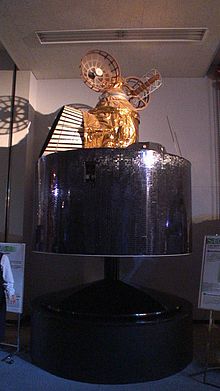This article has multiple issues. Please help improve it or discuss these issues on the talk page. (Learn how and when to remove these messages)
|
The Himawari (ひまわり, “sunflower”) geostationary satellites, operated by the Japan Meteorological Agency (JMA), support weather forecasting, tropical cyclone tracking, and meteorology research. Most meteorological agencies in East Asia, Southeast Asia, Australia and New Zealand use the satellites for their own weather monitoring and forecasting operations.

Originally also named Geostationary Meteorological Satellites (GMS),[1] since the launch of GMS-1 (Himawari 1) in 1977, there have been three generations, including GMS, MTSAT, and Himawari 8/9. Himawari 8/9 satellites are currently available for operational use.
Status
edit| Name | Launch date (UTC) |
Retirement | Rocket | Launch site |
|---|---|---|---|---|
| GMS-1 (Himawari 1) | 14 Jul 1977 | 30 Jun 1989 | Delta 2914 | Cape Canaveral |
| GMS-2 (Himawari 2) | 11 Aug 1981 | 20 Nov 1987 | N-II (N8F) | Tanegashima |
| GMS-3 (Himawari 3) | 3 Aug 1984 | 23 Jun 1995 | N-II (N13F) | Tanegashima |
| GMS-4 (Himawari 4) | 6 Sep 1989 | 24 Feb 2000 | H-I (H20F) | Tanegashima |
| GMS-5 (Himawari 5) | 18 Mar 1995 | 21 Jul 2005 | H-II (F3) | Tanegashima |
| MTSAT-1 (Mirai 1) | 15 Nov 1999 | Launch failure | H-II (F8) | Tanegashima |
| GOES-9 (Pacific GOES) [2] | 23 May 1995 | 14 Jun 2007 | Atlas I (AC-77) | Cape Canaveral |
| MTSAT-1R (Himawari 6) | 26 Feb 2005 | 4 Dec 2015 | H-IIA (F7) | Tanegashima |
| MTSAT-2 (Himawari 7) | 18 Feb 2006 | 10 Mar 2017 | H-IIA (F9) | Tanegashima |
| Himawari 8 | 7 Oct 2014 | Stand-by | H-IIA (F25) | Tanegashima |
| Himawari 9 | 2 Nov 2016 | Operational | H-IIA (F31) | Tanegashima |
| Himawari 10 | 2028 | 2045[3] | H3 | TBD |
History
editIn March 2023, Mitsubishi Electric announced that they had won the contract to build Himawari 10.[4] Himawari 10 is scheduled to be launched in 2028.[5]
See also
editReferences
edit- ^ "Exchange of Letters constituting an Agreement between the Government of Australia and the Government of Japan concerning Co-operation on the Project for the Geostationary Meteorological Satellite-4 System ATS 28 of 1990” Archived 16 April 2017 at the Wayback Machine. Australasian Legal Information Institute, Australian Treaties Library. Retrieved on 15 April 2017.
- ^ Usually excluded from Himawari series
- ^ "WMO OSCAR | Details for Satellite Programme: Himawari 4th Generation". space.oscar.wmo.int. Retrieved 12 October 2023.
- ^ "Mitsubishi Electric Wins New Japanese Meteorological Satellite Contract". www.businesswire.com. 14 March 2023. Retrieved 14 October 2023.
- ^ Bessho, K. (26 April 2023). Status of Himawari-8/9 and their follow-on satellite Himawari-10. CGMS-51. JMA. p. 5. Retrieved 7 December 2023.
External links
edit